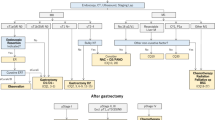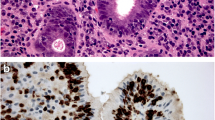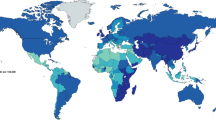Abstract
Objective
This study is to explore the effect of the Plan-Do-Check-Act (PDCA) cycle on the nutritional management of patients with nasopharyngeal carcinoma (NPC).
Methods
A total of 100 NPC patients were randomly divided into a control group and a PDCA group, with 50 patients in each group. The control group adopted a routine nutritional management strategy, and the PDCA group adopted a PDCA cycle management strategy. The body weight, body mass index (BMI), hemoglobin, serum prealbumin, serum albumin, the Patient-Generated Subjective Global Assessment (PG-SGA) score, the Nutrition Risk Screening 2002 (NRS-2002) score, the incidence rate of nutritional risk, the grade of malnutrition, and the grade of oral mucositis were compared between the two groups.
Results
The body weight, BMI, and serum prealbumin in the PDCA group were higher than those in the control group, and the difference was statistically significant (p < 0.05). The NRS2002 score and PG-SGA score in the PDCA group were lower than those in the control group, and the differences were statistically significant (p < 0.05). The incidence of nutritional risk, the grade of malnutrition, and the grade of oral mucositis were less in the PDCA group than those in the control group (p < 0.05). There was no significant difference in hemoglobin and serum albumin between the two groups (p > 0.05).
Conclusion
The PDCA cycle can improve body weight, BMI, and serum prealbumin in NPC patients. It can reduce the NRS2002 score, the PG-SGA score, the incidence of nutritional risk, the severity of malnutrition, and the severity of oral mucositis in NPC patients.
Similar content being viewed by others
Data availability
If the reader requires further information to help interpret the results, please contact the corresponding author.
References
Sung H, Ferlay J, Siegel RL, Laversanne M, Soerjomataram I, Jemal A et al (2021) Global cancer statistics 2020: GLOBOCAN estimates of incidence and mortality worldwide for 36 cancers in 185 countries. CA: Cancer J Clin 71(3):209–249
Küçükarda A, Erdoğan B, Gökyer A, Sayın S, Gökmen İ, Özcan E et al (2022) Prognostic nutritional index and its dynamics after curative treatment are independent prognostic factors on survival in non-metastatic nasopharyngeal carcinoma. Support Care Cancer 30:2131–2139
Chen Y-P, Chan AT, Le Q-T, Blanchard P, Sun Y, Ma J (2019) Nasopharyngeal carcinoma. Lancet 394(10192):64–80
Ji J, Jiang Dd, Xu Z, Yang YQ, Qian KY, Zhang Mx (2021) Continuous quality improvement of nutrition management during radiotherapy in patients with nasopharyngeal carcinoma. Nurs Open 8(6):3261–3270
Schneider P (1997) FOCUS-PDCA ensures continuous quality improvement in the outpatient setting. Oncol Nurs Forum 24(6):966–966
Yi C, Feng X, Yuan Y (2021) Study on the influence of PDCA cycle nursing based on network service on the quality of life and nutritional status of hypertension patients in home care. Evid-based Complement Alternat Med eCAM 2021: 6068876
Hu S-J, Long C-H, Chen G-L, Wei Y-Q, Chen G-F (2016) Effect of PDCA model on nutritional status in patients after laparoscopic repair of perforated peptic ulcer. J Hainan Med Univ 22(22):113–115
Gu X, Zhou W, Han J. Effect analysis of behavioral change strategy [applied to nutritional intervention in patients with pancreatic ductal adenocarcinoma, pp 963–966
McDowell L, Corry J, Ringash J, Rischin D (2020) Quality of life, toxicity and unmet needs in nasopharyngeal cancer survivors. Front Oncol 10:930
Lazim NM, Spinato G, Abdullah K, Boscolo-Rizzo P (2020) Survival rates and quality of life of nasopharyngeal carcinoma patients. In: An evidence-based approach to the management of nasopharyngeal cancer, Elsevier, pp 255–276
Wang X, Lv Y, Li W, Gan C, Chen H, Liu Y et al (2018) Correlation between psychosocial distress and quality of life in patients with nasopharyngeal carcinoma following radiotherapy. J Oncol 2018:3625302
Thompson LD, Bishop JA (2022) Update from the 5th Edition of the World Health Organization classification of head and neck tumors: nasal cavity, paranasal sinuses and skull base. Head Neck Pathol 16(1):1–18
Shi H, Zhao Q, Wang K et al (2015) Tertiary diagnosis of malnutrition. Chin J Cancer Prev Treat 7(5):313–319
Nitichai N, Angkatavanich J, Somlaw N, Voravud N, Lertbutsayanukul C (2019) Validation of the Scored Patient-Generated Subjective Global Assessment (PG-SGA) in Thai setting and association with nutritional parameters in cancer patients. Asian Pac J Cancer Prev APJCP 20(4):1249
Xu J-Y, Tian X-D, Song J-H, Chen J, Yang Y-M, Wei J-M (2021) Preoperative nutrition support may reduce the prevalence of postoperative pancreatic fistula after open pancreaticoduodenectomy in patients with high nutritional risk determined by NRS2002. BioMed Res Int 2021:6691966
Kondrup J, Rasmussen HH, Hamberg O, Stanga Z, Group AahEW (2003) Nutritional risk screening (NRS 2002): a new method based on an analysis of controlled clinical trials. Clin Nutr 22(3):321–336
Corish C, Flood P, Kennedy N (2004) Comparison of nutritional risk screening tools in patients on admission to hospital. J Hum Nutr Diet 17(2):133–139
Ye X-J, Ji Y-B, Ma B-W, Huang D-D, Chen W-Z, Pan Z-Y et al (2018) Comparison of three common nutritional screening tools with the new European Society for Clinical Nutrition and Metabolism (ESPEN) criteria for malnutrition among patients with geriatric gastrointestinal cancer: a prospective study in China. BMJ Open 8(4):e019750
Poziomyck AK, Cavazzola LT, Coelho LJ, Lameu EB, Weston AC, Moreira LF (2017) Nutritional assessment methods as predictors of postoperative mortality in gastric cancer patients submitted to gastrectomy. Rev Col Bras Cir 44:482–490
Grundmann O, Yoon S, Williams J (2015) The value of bioelectrical impedance analysis and phase angle in the evaluation of malnutrition and quality of life in cancer patients—a comprehensive review. Eur J Clin Nutr 69(12):1290–1297
Lynch MJ (2017) The application of self-administered nutrition screening tools and evaluations of the impact of malnutrition on quality of life in individuals with head and neck cancer Order No. 29245182, The University of Western Ontario (Canada)
Davies M (2005) Nutritional screening and assessment in cancer-associated malnutrition. Eur J Oncol Nurs 9:S64–S73
Bauer J, Capra S, Ferguson M (2002) Use of the scored Patient-Generated Subjective Global Assessment (PG-SGA) as a nutrition assessment tool in patients with cancer. Eur J Clin Nutr 56(8):779–785
Cox JD (1995) Toxicity criteria of the radiation therapy oncology group (RTOG) and the European organization for research and treatment of cancer (EORTC). Int J Radiat Oncol Biol Phys 31:1341–1346
Chen B, Hu S-X, Liu B-H, Zhao T-Y, Li B, Liu Y et al (2015) Efficacy and safety of electroacupuncture with different acupoints for chemotherapy-induced nausea and vomiting: study protocol for a randomized controlled trial. Trials 16(1):1–6
Moslemi D, Nokhandani AM, Otaghsaraei MT, Moghadamnia Y, Kazemi S, Moghadamnia AA (2016) Management of chemo/radiation-induced oral mucositis in patients with head and neck cancer: a review of the current literature. Radiother Oncol 120(1):13–20
Anderson PM, Lalla RV (2020) Glutamine for amelioration of radiation and chemotherapy associated mucositis during cancer therapy. Nutrients 12(6):1675
Levy RL, Olden KW, Naliboff BD, Bradley LA, Francisconi C, Drossman DA et al (2006) Psychosocial aspects of the functional gastrointestinal disorders. Gastroenterology 130(5):1447–1458
Liu Y, Liu M, Xu H, Wang H, Liu C, Zeb F et al (2019) Association of smoking-related Knowledge, Attitude, and Practices (KAP) with nutritional status and diet quality: a cross-sectional study in China. BioMed Res Int 2019:5897478
Waitzberg DL, Caiaffa WT, Correia MIT (2001) Hospital malnutrition: the Brazilian national survey (IBRANUTRI): a study of 4000 patients. Nutrition 17(7–8):573–580
Li G, Gao J, Liu ZG, Tao YL, Xu BQ, Tu ZW et al (2014) Influence of pretreatment ideal body weight percentile and albumin on prognosis of nasopharyngeal carcinoma: Long-term outcomes of 512 patients from a single institution. Head Neck 36(5):660–666
Wang X, Yang M, Ge Y, Tang M, Rao B, Chen Y et al (2021) Association of systemic inflammation and malnutrition with survival in nasopharyngeal carcinoma undergoing chemoradiotherapy: results from a multicentre cohort study. Front Oncol 11:766398
Deng J, He Y, Sun X-S, Li J-M, Xin M-Z, Li W-Q et al (2019) Construction of a comprehensive nutritional index and its correlation with quality of life and survival in patients with nasopharyngeal carcinoma undergoing IMRT: a prospective study. Oral Oncol 98:62–68
Epstein NE (2014) Multidisciplinary in-hospital teams improve patient outcomes: a review. Surg Neurol Int 5(Suppl 7):S295
Duan H, Chen Y, Wu H (2001) Nutritional status assessment of patients with oral maxillofacial cancers. Hua xi kou Qiang yi xue za zhi = Huaxi Kouqiang Yixue Zazhi = West Chin J Stomatol 19(5):300–302
Ma L, Wu T, Pan J, Kong X, Guo Q, Yang L et al (2014) The correlation between the comprehensive nutrition index and quality of life of patients with nasopharyngeal carcinoma treated by intensity-modulated radiotherapy. Nutr Cancer 66(1):152–158
Bharadwaj S, Ginoya S, Tandon P, Gohel TD, Guirguis J, Vallabh H et al (2016) Malnutrition: laboratory markers vs nutritional assessment. Gastroenterol Rep 4(4):272–280
Li P-J, Li K-X, Jin T, Lin H-M, Fang J-B, Yang S-Y et al (2020) Predictive model and precaution for oral mucositis during chemo-radiotherapy in nasopharyngeal carcinoma patients. Front Oncol 10:596822
Maria OM, Eliopoulos N, Muanza T (2017) Radiation-induced oral mucositis. Front Oncol 7:89
Acknowledgements
The authors thank all participants for their time and assistance.
Funding
The study is financially supported by the Guangxi Medical University 2022 Innovation and Entrepreneurship Training Program Project (No. 202210598019) and the Self-raised Scientific Research Fund of the Health and Family Planning Commission of the Guangxi Zhuang Autonomous Region (No. Z2016345).
Author information
Authors and Affiliations
Contributions
Study design: Xiaofen Zeng, Xueling Huang, Pengpeng Wang, Jinlian Liao. Data collection and analysis: Xiaofen Zeng, Xueling Huang, Liucong Wu, Jieying Liu, Hualin Wu, Rongsa Wei. Manuscript preparation, drafting and revising: Pengpeng Wang, Xiaofen Zeng, Xueling Huang, Jinlian Liao, Liucong Wu. All authors reviewed the manuscript.
Corresponding author
Ethics declarations
Ethics approval and consent to participate
The Medical Ethics Committee of the First Affiliated Hospital of Guangxi Medical University approved this study (NO. 2022-KT-Gui Wei-005). Participation was voluntary, and the subjects provided a written consent. The subjects had the right to refuse participation at all phases of the study.
Consent for publication
All authors consent for publication.
Competing interests
The authors declare no competing interests.
Additional information
Publisher's note
Springer Nature remains neutral with regard to jurisdictional claims in published maps and institutional affiliations.
Rights and permissions
Springer Nature or its licensor (e.g. a society or other partner) holds exclusive rights to this article under a publishing agreement with the author(s) or other rightsholder(s); author self-archiving of the accepted manuscript version of this article is solely governed by the terms of such publishing agreement and applicable law.
About this article
Cite this article
Zeng, X., Huang, X., Wang, P. et al. The application of the PDCA cycle in the nutritional management of patients with nasopharyngeal carcinoma. Support Care Cancer 31, 251 (2023). https://doi.org/10.1007/s00520-023-07724-4
Received:
Accepted:
Published:
DOI: https://doi.org/10.1007/s00520-023-07724-4




